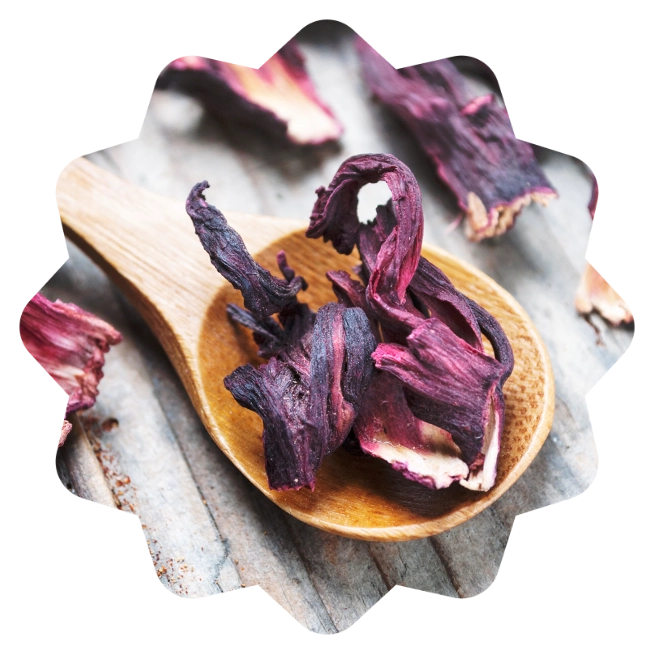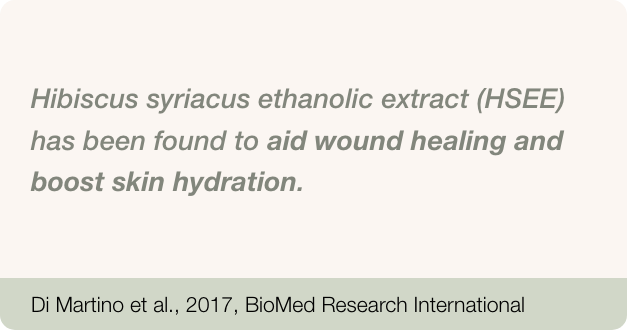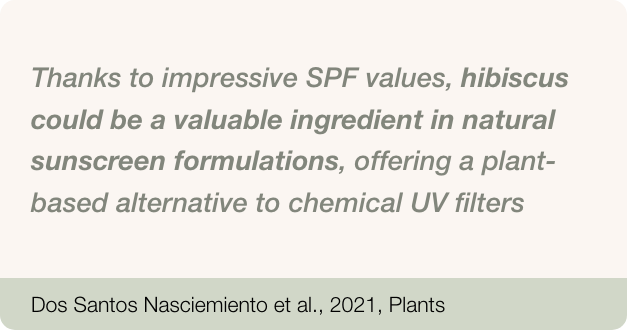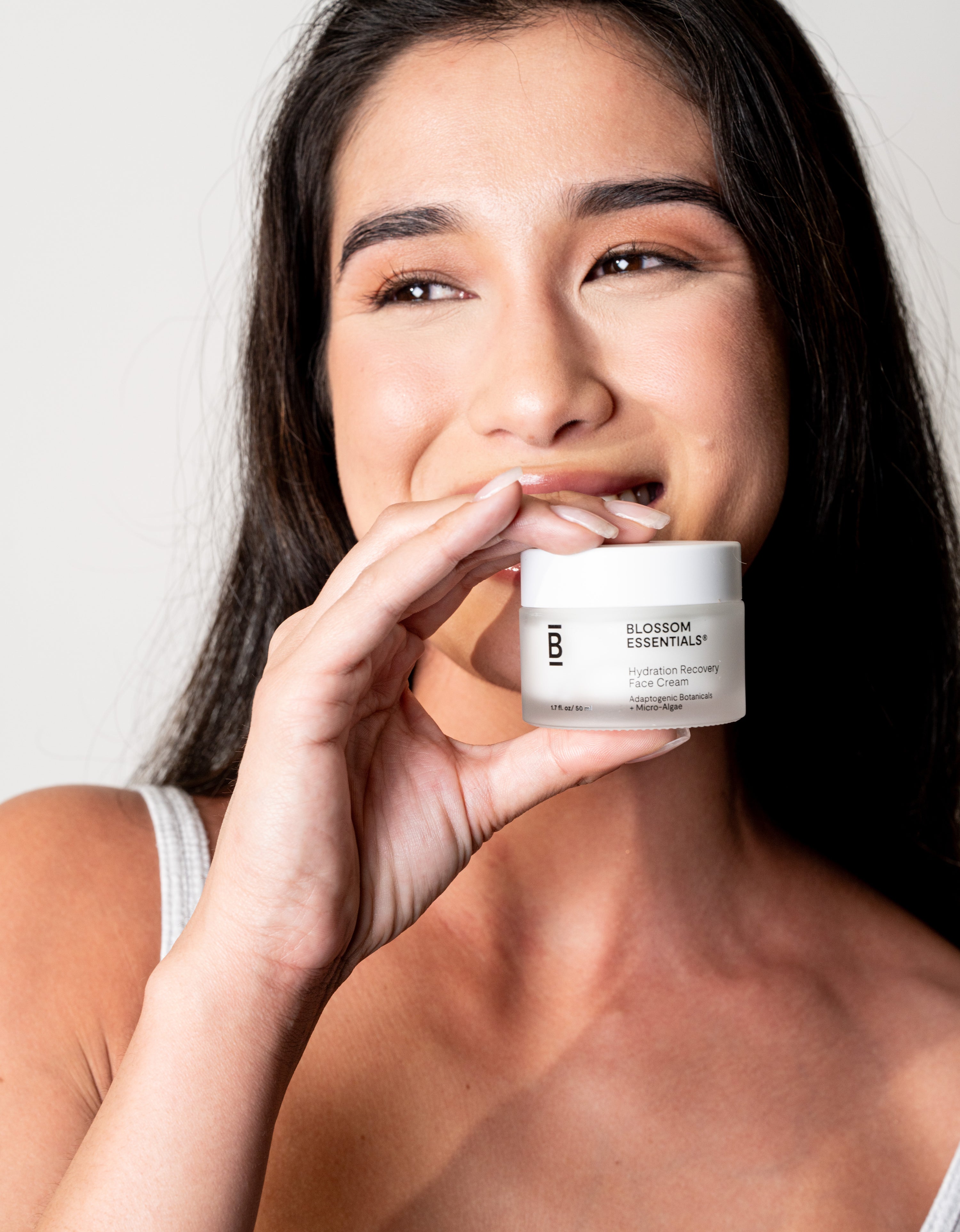

Spend $55.00 to Get Free USA Shipping



• The use of hibiscus in skincare dates back to ancient Egypt, where it was prized for its ability to enhance skin elasticity and radiance.
• Native to tropical regions, hibiscus has been used in traditional medicine and skincare for centuries, celebrated for its natural healing abilities.
• The extract is obtained through a gentle process of soaking hibiscus petals, preserving its potent antioxidants and vitamins for skincare formulations.
• Known as the "Botox plant," hibiscus flower extract helps to firm and lift the skin, reduce the appearance of wrinkles, and promote a youthful complexion.
• Hibiscus is rich in antioxidants like anthocyanins, which help combat free radicals, reducing oxidative stress and promoting healthier, more resilient skin.
Picture this: ancient civilizations, lush tropical landscapes, and a flower so stunning it was dubbed the “Queen of Tropical Flowers.” That’s where our story begins. The hibiscus plant, with its eye-catching petals and natural radiance, caught the attention of our ancestors long before modern skincare was even a twinkle in a scientist’s eye.
In ancient Egypt, where beauty rituals were as intricate as their pyramids, hibiscus was a prized ingredient. Cleopatra herself was said to have used hibiscus-infused oils to maintain her legendary beauty. Talk about a royal seal of approval! The Egyptians weren’t just after its skin-smoothing properties; they also used hibiscus tea as a refreshing drink to cool down in the scorching desert heat. Two birds, one very pretty stone!
Meanwhile, across the globe in China and parts of Southeast Asia, traditional medicine practitioners were beginning to recognize its potential for promoting overall health and vitality. They used various parts of the plant - from the leaves to the roots - to brew teas and create topical treatments. These remedies were believed to support everything from digestive health to… you guessed it, radiant skin!
But hibiscus wasn’t content with just conquering the ancient world. As trade routes expanded and cultures mingled, the love for this flower spread far and wide. In India, it found its way into Ayurvedic practices, where it was (and still is) revered for its cooling and soothing properties. Imagine the relief of applying a cool hibiscus paste on sun-kissed skin after a long day in the Indian summer heat. Bliss!
Fast forward to more recent times, and hibiscus has continued to bloom in popularity. In the early 20th century, as the cosmetics industry began to flourish, scientists started to take a closer look at what made traditional beauty remedies tick. Lo and behold, hibiscus emerged as a treasure trove of skin-loving compounds.
Researchers discovered that hibiscus flowers are packed with antioxidants, including anthocyanins and vitamin C. These powerhouse ingredients help fight off those pesky free radicals that contribute to premature aging. But that’s not all - hibiscus also contains natural alpha-hydroxy acids (AHAs) and a wealth of mucilage, a gelatinous substance that helps skin retain moisture. It’s like nature created its own all-in-one skincare solution!
As our understanding of skincare science has evolved, so has our appreciation for hibiscus. Today, you’ll find hibiscus flower extract in a wide array of products, from gentle cleansers to potent serums. Its natural exfoliating properties make it a go-to for those seeking a brighter, more even complexion. And let’s not forget its reputation as the “Botox plant” - a nod to its ability to help firm and lift the skin, giving those fine lines and wrinkles a run for their money.
But the hibiscus flower’s talents don’t stop at skincare. Its vibrant color has made it a natural choice for eco-friendly cosmetics, adding a pop of pink to lip balms and blushes without the need for synthetic dyes. Talk about a multi-tasker!
As we dive deeper into the science behind hibiscus flower extract, we’ll uncover even more reasons to fall in love with this botanical beauty. From its impressive antioxidant profile to its skin-soothing abilities, hibiscus is proving that sometimes, the best skincare solutions have been blooming right under our noses all along.
So, the next time you spot a hibiscus flower, whether it’s in a lush garden or on the label of your favorite skincare product, take a moment to appreciate its rich history. This isn’t just a pretty flower - it’s a time-tested, scientifically-backed skincare powerhouse that’s been enhancing beauty routines for generations. Now, that’s what we call flower power!
In recent years, hibiscus has emerged as a formidable ingredient in natural skincare, backed by a growing body of scientific research. This vibrant flower, often called the “Botox plant,” offers a plethora of benefits for skin health and appearance. Let’s delve into the scientific studies that illuminate why hibiscus deserves a prime spot in your skincare routine.
Hibiscus species, particularly Hibiscus syriacus, Hibiscus sabdariffa, and Hibiscus roseus, have been the focus of numerous studies exploring their potential in skincare applications. One of the most striking findings comes from research on Hibiscus syriacus ethanolic extract (HSEE). According to Di Martino et al. (2017), HSEE significantly enhances wound healing by stimulating fibronectin and collagen synthesis in human fibroblasts and keratinocytes. The study reported an impressive 60% increase in collagen synthesis and a 16% boost in fibronectin production. These proteins are crucial for maintaining skin elasticity and structure, suggesting that hibiscus extract could be a powerful anti-aging ingredient.
The same study also highlighted hibiscus’s role in skin hydration. HSEE was found to increase the expression of aquaporin 3 and filaggrin genes by 20% and 58%, respectively. These genes are vital for maintaining skin moisture and integrity, indicating that hibiscus extract could help combat dry skin and improve overall skin barrier function.

Antioxidant properties are another area where hibiscus shines. Dos Santos Nascimento et al. (2021) investigated Hibiscus roseus extracts and found them rich in phenolic compounds, including flavonoids and hydroxycinnamic acids. These compounds exhibit strong antioxidant activity, making them suitable for anti-aging applications in skincare. Antioxidants help protect the skin from free radical damage, which is a major contributor to premature aging.
Sun protection is a critical aspect of skincare, and hibiscus shows promise in this area as well. The study by dos Santos Nascimento et al. (2021) revealed that hibiscus extracts demonstrate SPF values comparable to synthetic standards. This finding suggests that hibiscus could be a valuable ingredient in natural sunscreen formulations, offering a plant-based alternative to chemical UV filters.
While these results are impressive, it’s important to note that not all hibiscus extracts are created equal. Widowati et al. (2017) studied Hibiscus sabdariffa extract and found that while it contains beneficial compounds like phenols, flavonoids, and tannins, its antioxidant and anti-aging activities were moderate compared to isolated compounds like myricetin. However, the extract did show moderate collagenase inhibitory activity, which is crucial for maintaining skin elasticity and preventing wrinkle formation.

Recent research by Yang et al. (2019) has shed light on the anti-inflammatory properties of Hibiscus syriacus flowers. The study demonstrated that hibiscus extract significantly reduces nitric oxide production and cytokine expression in skin cells, offering protection against skin inflammation and damage. This anti-inflammatory action could be particularly beneficial for those with sensitive or acne-prone skin.
Furthermore, Yang et al. (2019) corroborated earlier findings on hibiscus’s hydration benefits, showing that the extract enhances hyaluronan production. Hyaluronan is a key molecule for skin hydration and plays a crucial role in wound healing. The study also found that hibiscus extract promotes wound healing by activating VEGF signaling, further cementing its status as a multifaceted skincare ingredient.
In conclusion, scientific research strongly supports the use of hibiscus extracts in skincare and cosmetic products. From boosting collagen production and enhancing skin hydration to offering antioxidant protection and anti-inflammatory benefits, hibiscus proves to be a versatile and effective natural ingredient. As we continue to seek out plant-based alternatives in our beauty routines, hibiscus stands out as a scientifically-backed option that delivers real results for skin health and appearance.
Hibiscus extract is a versatile ingredient in the beauty and skincare industry, celebrated for its natural efficacy and wide-ranging benefits. Here, we explore some of the specific applications of hibiscus extract in skincare products, highlighting its transformative potential.

🌺 The anthocyanins in hibiscus (the “botox plant”) stimulate elastin production, which helps maintain the skin’s youthful appearance by reducing the visibility of fine lines and wrinkles.
🌺 The natural alpha-hydroxy acids (AHAs) present in hibiscus make it an excellent exfoliant. These acids help remove dead skin cells, promoting the growth of new ones and leading to a brighter, more even complexion.
🌺 Hibiscus is renowned for its exceptional hydration properties. Its high mucilage content acts as a natural humectant, attracting and retaining moisture in the skin. The extract’s ability to lock in moisture is particularly beneficial for dry and sensitive skin types.
🌺 Hibiscus extract is effective in evening out skin tone and reducing hyperpigmentation. The acids in hibiscus, such as citric and malic acids, help control melanin production, leading to a more uniform complexion.
🌺 Rich in antioxidants and anti-inflammatory compounds, hibiscus extract aids in healing and soothing the skin. It promotes cell regeneration and reduces redness and irritation, making it ideal for use in products designed for sensitive or acne-prone skin.
Revitalize dry, tired skin with our luxuriously rich day and night cream. Powered by chlorella, tremella mushroom, tamanu seed and hibiscus, these adaptogenic botanicals and micro-algae provide all-day hydration while keeping flare ups at bay. With 7 potent actives, it goes beyond hydration to brighten, firm, and maintain moisture levels, helping to calm the skin and prevent future flares. (1.7 fl. oz)